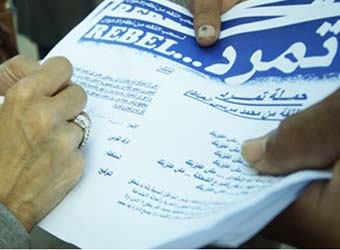After 10 action-packed days of regime toppling and bloody clashes, Cairo is hunkering down for Ramadan, the month of fasting when Muslims forgo food, drink and tobacco from dawn to dusk. Traffic is thin in my downtown neighborhood but I can hear televisions blaring the latest developments. People are talking about Egypt’s new interim government, amid a general feeling that, at least today, the first day of Ramadan, everyone can relax.
With President Mohamed Morsi under house arrest, there are a lot of questions about Egypt’s democratic transition and the role of Tamarrod, the grassroots movement that sparked Egypt’s so-called second revolution.
In May, when I first heard about Tamarrod’s petition calling for Morsi’s resignation, I thought: That’s nice, the opposition is finally getting its act together, encouraging people to take a stand against the fumbling of the president. The effort seemed like a fairly tame expression of discontent, and not a little whimsical. It would take a lot more than a petition, I thought, to pry the Muslim Brotherhood’s Freedom and Justice Party out of a governmental system they’d been systematically monopolizing over the last year. How wrong I was. That petition — disseminated by thousands of volunteers and said to have drawn many millions of signatures — became a catalyst for historic change.
Now, if you ask Egyptians what they think of Tamarrod, which means “rebellion” in Arabic, you’ll mostly hear complimentary colloquialisms like “cream!” (eshta), “100 percent!” (miyya-miyya) — or you’ll get a simple response of two thumbs up.
Still, protesting is one thing, and turning a popular movement into a lasting political force is another. So far the young leaders of Tamarrod have managed to take advantage of their group’s popularity. At the end of June, Tamarrod confidently announced the establishment of the June 30 Front, a coalition of disparate opposition forces they’d united around a roadmap to guide the nation after Morsi’s ousting.
Following the July 3 military “coup by popular demand,” the Front participated in a pow-wow with the army, members of the National Salvation Front, an older opposition coalition including the former U.N. diplomat Mohamed ElBaradei, and religious figures including the Coptic pope, the sheikh of al-Azhar and members of the ultra-conservative Al Nour party.
Consensus was reached and several June 30 Front demands have been met. First, the head of the constitutional court, Judge Adli Mansour, was appointed interim president, charged with assembling a cabinet of technocrats and amending the current Constitution. Then the liberal economist Hazem El-Beblawi was named prime minister, though the Front had originally asked for ElBaradei, who instead became vice president. Presidential elections have been announced for early 2014, in keeping with the roadmap for a brief transition. Amending the Constitution to allow for a representative government — in other words, a less-Islamist one — remains a source of contention.
Many of my friends who participated in the 2011 revolution and hated seeing the Brotherhood in power are just as upset at seeing revolutionary youth at the negotiating table with the generals. During its last transitional tenure the army had trampled civil rights and mowed down civilian protesters. Who could say they wouldn’t do it again? Members of the Muslim Brotherhood have been arrested, their TV stations shut down, and on July 8, more than 50 of their supporters died in clashes with security forces at a military compound.
But the most widespread opinion is voiced by the Tamarrod member Yassir Fouad, a pharmacist. “The army was our weapon,” he said, meaning the muscle to force the president to comply with the people’s — and Tamarrod’s — demands.
Tamarrod’s members have seen death and danger up close since 2011, and many have long histories of activism. However, seasoned by the last three years of struggle for “bread, freedom and social justice,” they are moving into uncharted territory. They have the public’s support, but they are young civilians dealing with Egypt’s wily old generals.
Some say the generals are using Tamarrod, offering them the illusion of participating in Egypt’s future in exchange for having hastened the Brotherhood’s demise. The army was never happy with the Brotherhood in power, but put up with it because whoever took over the mess left by Mubarak was bound to fail. June 30 gave the generals an excuse to step in once again as heroes — and settle some scores.
For now, Tamarrod is riding the wave of events it precipitated, and its leadership is convinced it can reshape Egypt’s future. “We are not naïve,” Fouad reassured me. “We want to see Egypt run as a modern secular state,” he said. Many Egyptians seem to agree.
Today Tamarrod is calling for a communal iftar, the sunset meal that breaks the daily fast, not just in Tahrir Square but all over Egypt. It is urging people to share this moment as family, to overcome political differences in the name of all they have in common. It seems a lot to ask, considering the Islamists’ fury at their reversal of fortune, but I‘ve been wrong before.
About the Writer:
Maria Golia is a columnist for the Lebanon Daily Star and The National, and a permanent correspondent for The Middle East.
Source: The New York Times


